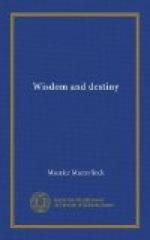Our consciousness is our home, our refuge from the caprice of fate, our centre of happiness and strength. But these things have been said so often that we need do no more than refer to them, and indicate them as our starting-point. Ennoblement comes to man in the degree that his consciousness quickens, and the nobler the man has become, the profounder must consciousness be. Admirable exchange takes place here; and even as love is insatiable in its craving for love, so is consciousness insatiable in its craving for growth, for moral uplifting; and moral uplifting for ever is yearning for consciousness.
8. But this knowledge of self is only too often regarded as implying no more than a knowledge of our defects and our qualities, whereas it does indeed extend infinitely further, to mysteries vastly more helpful. To know oneself in repose suffices not, nor does it suffice to know oneself in the past or the present. Those within whom lies the force that I speak of know themselves in the future too. Consciousness of self with the greatest of men implies consciousness up to a point of their star or their destiny. They are aware of some part of their future, because they have already become part of this future. They have faith in themselves, for they know in advance how events will be received in their soul. The event in itself is pure water that flows from the pitcher of fate, and seldom has it either savour or perfume or colour. But even as the soul may be wherein it seeks shelter, so will the event become joyous or sad, become tender or hateful, become deadly or quick with life. To those round about us there happen incessant and countless adventures, whereof every one, it would seem, contains a germ of heroism; but the adventure passes away, and heroic deed is there none. But when Jesus Christ met the Samaritan, met a few children, an adulterous woman, then did humanity rise three times in succession to the level of God.
9. It might almost be said that there happens to men only that they desire. It is true that on certain external events our influence is of the feeblest, but we have all-powerful action on that which these events shall become in ourselves—in other words, on their spiritual part, on what is radiant, undying within them. There are thousands of men within whom this spiritual part, that is craving for birth in every misfortune, or love, or chance meeting, has known not one moment of life—these men pass away like a straw on the stream. And others there are within whom this immortal part absorbs all; these are like islands that have sprung up in the ocean; for they have found immovable anchorage, whence they issue commands that their destiny needs must obey. The life of most men will be saddened or lightened by the thing that may chance to befall them—in the men whom I speak of, whatever may happen is lit up by their inward life. When you love, it is not your love that forms part of your destiny; but the knowledge of self that you will have




